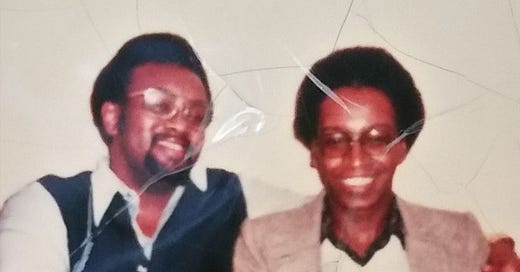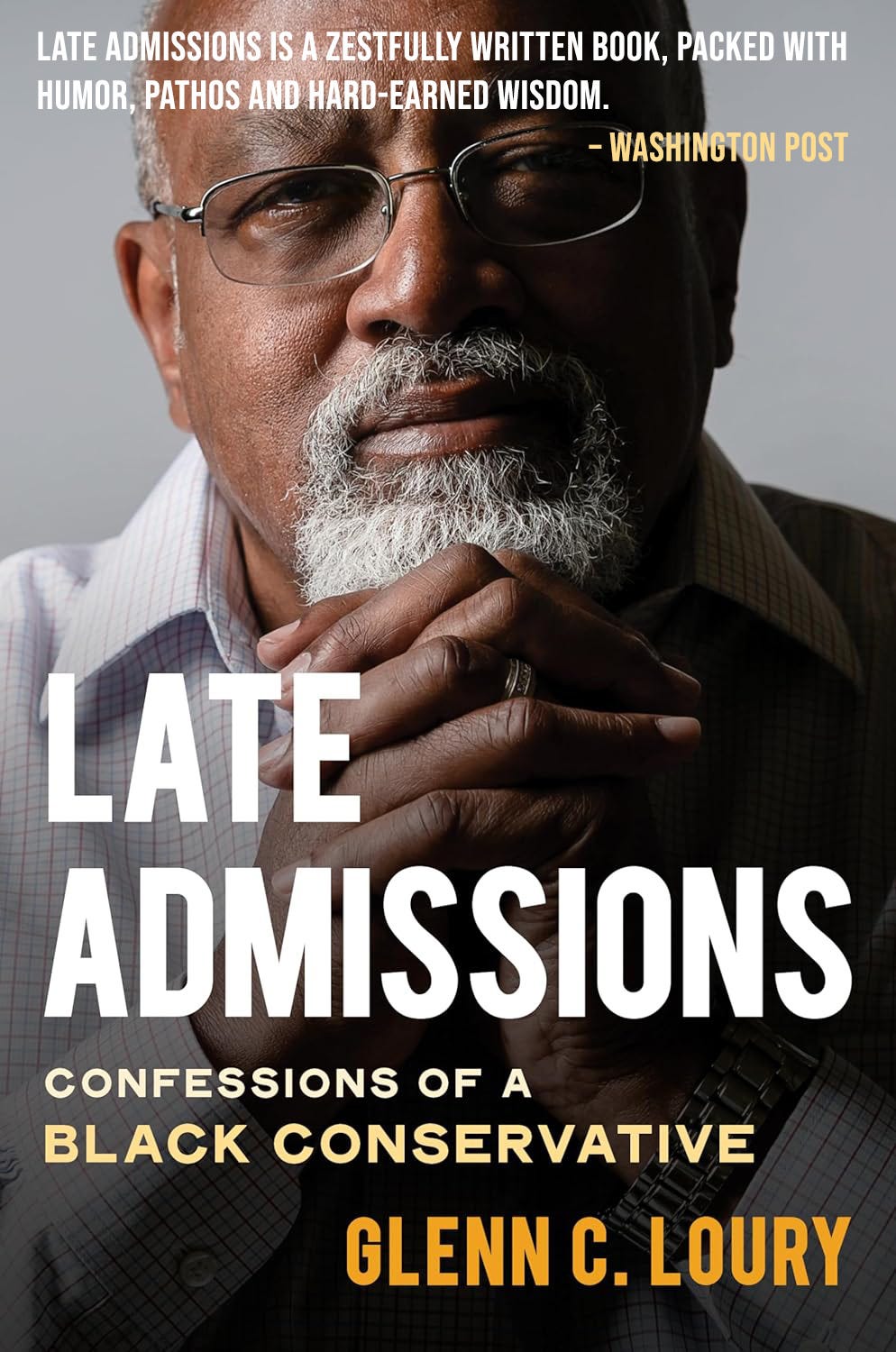Last Sunday marked the 13th anniversary of the death of Dr. Linda Datcher Loury, my wife and friend for over three decades. As readers of Late Admissions will know, she was an extraordinary person—a fierce athlete and competitor, a woman of intellectual and moral integrity, a skilled economist, a great mother of our two sons, Glenn and Nehemiah, and a loving and supportive spouse. Around this time every year, I reflect on how lucky I was to know her at all, much less to have been married to her.
I’ve said a lot about Linda, but I wanted to highlight something I wrote just after her death. The occasion was an event honoring her life and work hosted by the economics department at Tufts, where she taught for over twenty-five years. Her colleagues knew her work and they knew her teaching, which was one of the great joys of her life. For my contribution to the service, I wanted to pay tribute to the special intellectual partnership we shared, the way we challenged each other and made each other better, sharper thinkers. That aspect of our relationship, which melded love and labor, was truly singular. Lord knows, I would not be the man I am nor the economist I am were it not for her.
This post is free and available to the public. To receive early access to TGS episodes, an ad-free podcast feed, Q&As, and other exclusive content and benefits, click below.
Reflections on an Intellectual Partner
Remarks on the Occasion of the Memorial Service Honoring Linda Datcher Loury Tufts University, November 5, 2011
My intellectual partnership with Linda Datcher Loury began 37 years ago, in the fall of 1974, when Linda enrolled in the doctoral program in economics at MIT. I had arrived at MIT two years earlier, and while trying to settle on a thesis topic, I supplemented my income by providing tutoring services for students taking the first‐year microeconomic theory sequence. I was assigned to work with Linda during her first semester, and that’s how we came to know one another. Our relationship began with me trying to help her decode Paul Samuelson’s fascinating (though often rambling) lectures on welfare economics, and to comprehend Marty Weitzman’s rigorous, though mathematically demanding and quite obscure derivation of the Kuhn‐Tucker Theorem. I thank God that our friendship didn’t end there!
Suffice it to say that Linda cleared these formidable hurdles of the program’s first year with ease, and that our friendship moved beyond the stuff of problem sets to find, shall we say, more fertile ground. By the time I left MIT to take my first teaching job at Northwestern University, Linda and I had become very close, indeed. Over the next two years, with Linda remaining in Cambridge and me in Chicago, our bonds of intimacy easily bridged the 1,000 miles separating us. After Linda completed her dissertation in 1978, she moved to her first job, on the research staff of the Survey Research Center, in the Institute for Social Research at the University of Michigan. I joined her in Ann Arbor as an Associate Professor of Economics one year later, and there we finally became a couple destined to spend the next 32 years building our lives together.
As you know, Linda was an empirical labor economist, and in those years I thought of myself primarily as an economic theorist. Thus one might imagine that, whatever the strength of our personal connections, we would not have that much to talk about as far as research was concerned: she’d be busy running her regressions and I’d be preoccupied with proving my theorems. In fact, nothing could be further from the truth. Linda and I had a lot to say to one another about research. We talked economics incessantly. I was interested in her data, and learned from her enormously in those early years. And, what always came as something of a surprise to me, she was genuinely interested in my theoretical work. She’d force me to tell her the significance my latest theorem in plain English, and she’d always insist that if I couldn’t make her—a non‐mathematician—understand the logic of my result then, evidently, I didn’t really understand it myself!
Our intellectual partnership was noteworthy from both a substantive and a stylistic point of view. As for the style of our interactions, let’s just say there was never a dull moment. To be sure, our personalities were very different. I was the hothead, given to vituperation and verbal excess—especially in the heat of argument, even being known to raise my voice on that rare occasion when this seemed necessary. Linda was calmer, less given to the rhetorical flourish or the ostentatious display of erudition (though her learning in the applied social science literatures was every bit as broad and as deep as was my own.) She was quicker to admit error and less in need than was I of having the last word in an argument.
But she was also enormously tough‐minded, even stubborn, I sometimes thought. When it came to arguing about ideas, Linda would not be intimidated or browbeaten. (I know, because I tried!) She gave just as good as she got. And our discussions—about economic inequality, about race and the labor market, about intergenerational mobility and the economics of the family, about affirmative action, about labor unions and the decline of American manufacturing, about minimum wage legislation, about welfare reform, or about the merits of certain (unnamed here!) black public intellectuals, to give a few examples—were invariably of great value to me.
You see, I suffered from the theorists’ disease of glossing too quickly over the facts in my rush to find an elegant, abstract formulation of some issue. “An idea so beautiful it must be true,” was my attitude. Linda, with feet planted firmly on the ground, would invariably say something like, “How could you possibly know that?”; “What evidence is there for this assumption?”; “How would you test that implication?”; “How could we, even in principle, take this to the data?” She helped keep me grounded. She had terrifically good commonsense. In matters of economic research, Linda was a wise woman.
Linda Datcher Loury was also a source of encouragement and moral support for me in my intellectual work. There are books and papers out there with my name on them that would never have been written but for her steadfast support, encouragement, and, frankly, her cajoling. She often seemed to believe in me and in my ideas, even more than I did myself. During my “conservative phase,” when I moved to the right on issues of race and social policy in the 1980s, she often disagreed with particulars (especially when it came to the “voting for Ronald Reagan” part) but she stood with me and even pushed me further on some of my most controversial themes, like the crucial importance of acknowledging and rectifying patterns of behavior within black communities that contributed to African American’s social disadvantages. She was not afraid to break the bonds of political correctness.
Linda also had an exceptionally strong work ethic. She was disciplined and organized in the conduct of her research. She met her deadlines and burned the midnight oil whenever necessary. I am, shall we say, a bit more relaxed about deadlines and such. I tend to procrastinate and to let things slide. Linda served me as a taskmaster by gently but insistently reminding me to get my work done. More importantly, though, she inspired (and, truth be told, shamed) me simply by putting her own nose to the grindstone—that is, by productively and responsibly using her time. It’s hard to be a laggard when you’re living with someone like that.
Linda’s important work on social economics has been described already by others, so I won’t dwell on details. That she got her professional start at ISR in the late 1970s was a real boon for both of us. As many of you know, the SRC at ISR was home to the Panel Study of Income Dynamics, that longitudinal survey of 5,000 American families who were being followed year‐to‐year and questioned about all manner of economic and social factors. For someone interested in the intergenerational transmission of economic status, as were Linda and I, this unique early longitudinal data set was a veritable gold mine. A number of Linda’s early and important papers draw on these data. (She later came to rely heavily on the National Longitudinal Survey of Youth which was also initiated in those years.)
Linda’s involvement at the center of Michigan’s longitudinal data collection effort opened a window for me onto the subtle and complex issues involved in the gathering, collating, and processing of survey data. Her work and that of others using these data, also provided confirmation for me of the importance for determining the later‐life success realized by young people of the family structure, neighborhood organization and social interactions to which they were exposed in their formative years. My own papers on the theory of income dynamics and persistent racial inequality, on the economics of affirmative action policies, on the distinction between “discrimination” and “stigma” in explaining racial economic disparities, on the rationality of dysfunctional identities, and on the self‐confirming nature of racial stereotypes were all profoundly and positively influenced by my intellectual partnership with Prof. Linda Datcher Loury.
Speaking as a husband and a father, I will miss my wife tremendously, of course. And, speaking as a scholar, I will see things a little less clearly, express myself a bit less surely, meet my deadlines less frequently, and ponder the often incomprehensible nature of social life with less confidence without my intellectual companion and life partner. The light of understanding for me has grown dimmer and the path ahead is unclear.
Thank you.







What a beautiful essay and moving tribute to an extraordinary woman! She was lucky to have you also and I’m sure you enriched her life and work just as much as she did yours. The world is made richer, stronger, and more powerful by both your work and hers. As teachers, you truly do and did touch the future. Whatever happens from here on out, the seeds you both planted in your students and followers will continue to bloom and blossom for generations to come. Thank you.
Thank you for sharing this. Based on your comments on The Glenn Show, the book, and now this email, it is clear Linda was an extraordinary person. May she rest in peace as she lives on in the hearts of you, your sons and other loved ones.